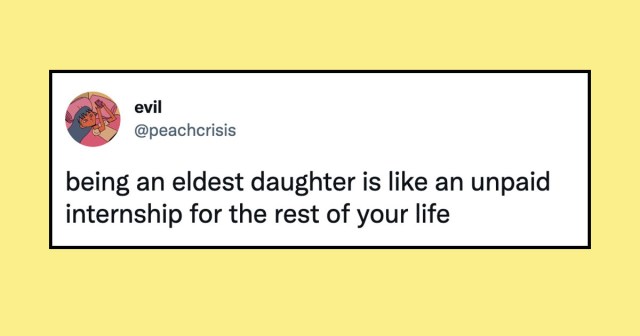Looks like there’s a reason eldest daughters keep getting it done
Do you have memories of being the de facto babysitter for your brothers and sisters from a young age? Then you might be a first-born child!
Several studies have emerged in recent years affirming what eldest daughters have known our entire lives: First-born kids are more stressed than their siblings. Not only do we now feel seen, but we also feel justified for carrying all that extra anxiety into our adulthood.
“It’s also not unheard of to hear parents say that they delegate some of the responsibility of looking after their youngest children to their oldest child,” psychotherapist Caroline Plumer tells Metro.co.uk. Because of that expectation, kids take on adult pressures and stress from a young age that often follows them into adulthood.
https://twitter.com/eulatales/status/1527215062238171138?s=20&t=Q7a35eCcSN-v8y2P_wJ9pg
It’s eldest daughter vs the world pic.twitter.com/rp0PZ9cbQS
— Fatima (@imfatima_02) August 24, 2022
“Eldest sisters will have spent at least a small portion of their lives as only children, and as such, have largely had adults, and particularly their mothers, to model their behaviors on,” Plumer goes on to explain. “Even today, women are still typically seen as the family caregivers, and if the mother is incapacitated for whatever reason, expectation can fall on the eldest child to step into her role.”
https://twitter.com/STRAWB3RRYMOO/status/1359291302039281667
And it’s not just outside pressures that instill us older children with a heart-thumping desire to take on excess responsibility. There’s a physiological response, too.
being an eldest daughter is like an unpaid internship for the rest of your life
— 🌟 (@peachcrises) June 28, 2021
Ok but imagine a reality show where it’s an agency of eldest daughters and they solve different situations
— 👑Thugnificent👑🇸🇩 (@igbaaallin) March 22, 2021
A study from the 1970s showed that heart rate and respiration rate were found to increase more noticeably in eldest children who were exposed to four types of stimuli that included “tones, shocks, and problems.” Were the “tones” varying levels of screaming baby brothers and sisters? We think so.
Boomer moms are living laughing loving only because their eldest daughters are screaming crying throwing up.
— Meleyna Nomura (@meleyna) August 29, 2022
In 1961, another study found that found that “first-born children are subjected to more inconsistent nurturance than are later-born children and consequently show more dependency behavior in the form of affiliative responses.” So basically, we lack independence and instead thrive on dependent behavior where other people need us and give us all the stress.
are you a natural born leader or are you just an eldest daughter
— Kristin (@skibidi_kristin) August 29, 2022
older sisters should get the credit for playing the role of second mother
— Verifíed Pakistan 🇵🇰 (@Veri5edPakistan) August 29, 2022
If you are a card-carrying first-born, you may have been given a ton more responsibility than your siblings growing up. But we’re betting that it turned you into the organized, self-reliant, and determined (albeit a little over-stressed at times) person you are today.
Not a bad hand to be dealt, if we’re being honest.
